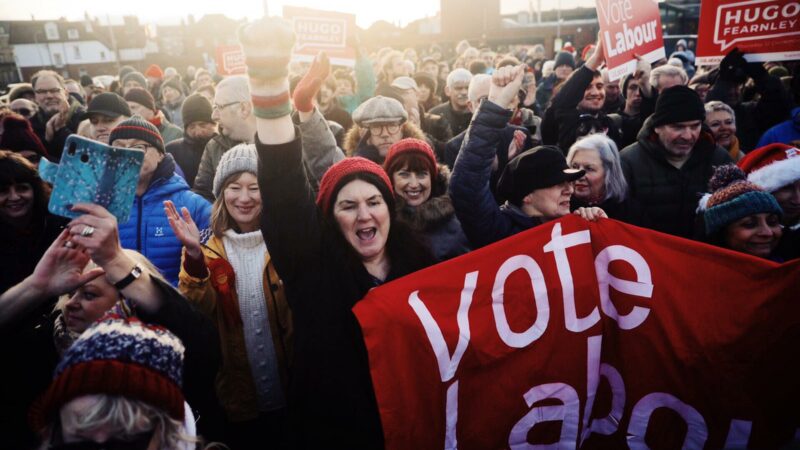
Tony Blair is right. Without a total change Labour will die. The problem is, the political tradition Blair represents – the so-called Labour ‘moderates’ – has shown itself incapable of coming up with any ideas for what that change looks like. Changing doesn’t mean simply saying we need to ‘change the things that need changing’, or that we have already changed but not enough. It means correctly analysing the problem and actually coming up with concrete ways to solve it.
For Blair and his allies, some of whom exert significant influence over the Labour leadership, the problem is that Labour is still too left wing – it always is. While this is often discussed in terms of electability and the idea that elections are won from the centre ground, in his more candid moments Blair has revealed that even if Labour could win from the left, he wouldn’t have it. He is as ideological as they get.
So, whenever we hear talk of the need to run to the centre-ground we should be suspicious. It is usually a convenient excuse to drop the radicalism, whether it’s popular or not. But, as we saw in the 2017 general election and regularly in the polls, there is a huge appetite for economic transformation. This is where the new centre ground is. Because the centre ground is not some fixed place. It changes over time and it is re-made.
It was Margaret Thatcher who used the inflation and debt crises of the 1970s to make a convincing argument that the post-war consensus that shaped both Tory and Labour government policy-making was broken, and that a new centre ground needed to be established. Thatcher duly did this and New Labour coordinated its politics based on the changes she brought about, as she herself later acknowledged.
But we have once again entered a period in British politics defined by instability and where the centre ground is shifting. Among voters of all stripes, consent for the status quo has been crumbling for a decade. At the root of this is a volatile yet stagnant economic model that produces inequality and a national identity crisis, rooted in imperial nostalgia and a sense that Britain has changed for the worse.
The Tories understand this. With Brexit and their embrace of greater state spending, at least rhetorically, they have begun to construct a new common sense and a powerful electoral majority. They have responded to a crisis by attempting to define it and shape its outcome. Worryingly, the Labour leadership has been comparatively static, offering little in the way of a coherent analysis of what is wrong with Britain today or any sense of what it would do to fix it if elected.
As a result Labour looks increasingly directionless and has even been outflanked to the left by the Tories on economic issues such as a corporation tax rise. We saw this play out in Hartlepool, where Labour said nothing and got nothing. We also saw it in places like Bristol, where the Greens made massive gains partly due to Labour’s refusal to affirm the party’s previous ambition on climate change as well as the bizarre decision by the Labour leadership to attack the Labour activist in the area.
Yet, where Labour has offered something substantial it has done well. Community wealth building programmes in Preston and Salford, for example, have shown that socialist ideas are practical and can make a difference to the lives of working class people. It is here that we can find the foundations for a future vision of socialist change that is radical and realistic, and which has the potential to unite working-class voters across the country. There is much more thinking to be done on scalability and the need to align localism with national level infrastructure investment and initiatives such as a green jobs revolution, but the seeds of change are present and they are already starting to bloom.
Alongside this, where local Labour parties have embraced community organising and the latest campaigning techniques they have prospered, such as in Walton and Broxtowe. The future of Labour as an effective campaigning force will depend on the extent to which these skills and experiences can be generalised across the entire party, and at Momentum we will play our part in this. There was an attempt to do this under the leadership of Jeremy Corbyn and, while the community organising unit (COU) was still in its early phase of development, it enjoyed remarkable success.
Keir Starmer, of course, has decided to gut the COU and there are many around him who are opposed to either transformative policy or innovative ways of organising and campaigning. Their vision, and Blair’s too, increasingly seems to be a Macron-style project with a party distant from its members, trade unions and local communities, and willing to align with big business and media barons.
But it won’t work. This failed political model has lost consent. The Tories know it – that’s why they have moved away from the politics of the coalition years and that’s why their vote has skyrocketed. Labour needs to learn this lesson too. The simple truth is that people want change and it is the historic role of the Labour Party to usher in that change, in a way that is reassuring but delivers substantial benefits to the lives of working-class people. If we don’t, they will go elsewhere and not only will Starmer be out of a job but Labour will be out of government forever.




More from LabourList
Reeves bets on patience over populism
‘Energy efficiency changes must work for older private renters’
‘Labour’s creative destruction dilemma’